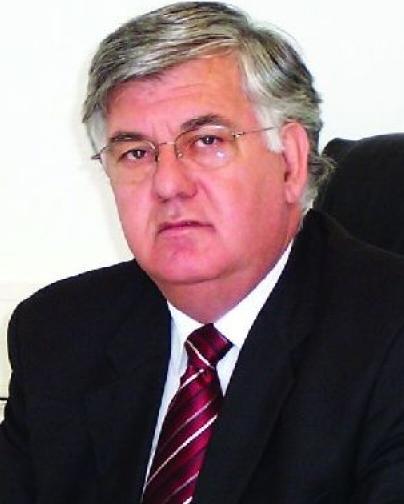KEYNOTE SPEAKERS

Prof. Nikolaos G. Bourbakis
Synergies of AI and Knowledge Engineering for Healthcare & Biomedicine
Abstract: In the last two decades a few major scientific events have significantly impacted the Academic and Industrial evolution. One of them is the widely acceptance of Artificial Intelligence (AI) in the Applications domain. Another one is the increased computational power of IT tools for very large scale of applications in Data & Knowledge Engineering. As a result of this evolution, advanced AI (specifically machine learning) and Engineering of Knowledge methods have made their appearance by triggering the interest and the concerns of the Scientific Community and the Society at large. In addition, in complex environments single based methodologies will not offer robust and wide range solutions. Thus, this talk will not offer specific solutions to problems based on single methods or cover every aspect of a problem, but rather will address how Synergies of AI and Knowledge Engineering Methods may offer better solutions to some of these complex problems, i.e. in Healthcare & Biomedicine.
Short bio: Prof. Nikolaos Bourbakis (IEEE Life Fellow) currently is a Distinguished Professor of Information & Technology and the Director of the Center of Assistive Research Technologies (CART) at Wright State University, OH. He is the Founder and the EIC of three International Journals (Artificial Intelligence Tools (World Scientific Publ.), Monitoring and Surveillance Tech Research (IGI-Global, Publ.), and Bioengineering & Bioinformatics (EAI Transactions)) the Founder and the Steering Committee Chair of several International IEEE Computer Society Conferences (ICTAI, BIBE, IISA), Symposia and Workshops. He pursues research in Assistive Technologies, Applied Artificial Intelligence, Bioengineering, Information Security, and Distributed Processing funded by USA and European government and industry. He has extensively published in IEEE and International Journals and Conferences, and he has graduated several dozens of PhD students. His research work has been internationally recognized and won several prestigious awards in IEEE, Universities and Societies.

Prof. Peter P. Groumpos
Dept. of Electrical and Computer Engineering, University of Patras, Greece
Coronavirus Diseases And Intelligent Systems: Issues And Challenges
Abstract: This keynote paper is addressing the general issue of Coronavirus diseases. The humankind was caught by surprise when the first news for a new flue or epidemic disease was emerging from the greater region of Wuhan of China. Very soon was associated with Coronavirus epidemics. It was named SARS-CoV-2 or known today as COVID-19. On March 11th of 2020 the WHO has accepted COVID-19 as a pandemic disease. However, Coronavirus diseases have been around long before COVID-19. Coronaviruses are named for the crown-like spikes on their surface. There are four main sub-groupings of coronaviruses, known as alpha, beta, gamma, and delta. Human coronaviruses were first identified in the mid-1960s. Today, there are seven Coronaviruses that can infect people.
In this keynote paper an overview of these seven Coronaviruses and some very interesting historical facts are given. It is interesting to follow how coronaviruses emerged from the mid-1960s to todays pandemic of COVID-19. The not so far two Human Coronaviruses are briefly reviewed:
- MERS-CoV (the beta coronavirus that causes Middle East Respiratory Syndrome, or MERS) and
- SARS-CoV (the beta coronavirus that causes severe acute respiratory syndrome, or SARS)
However the most recent one: SARS-CoV-2 (the novel coronavirus that causes coronavirus disease 2019) or better known as COVID-19 is addressed in more details. Symptoms and diagnosis methods are reviewed. A summary of studies since the outbreak is presented. The lack of serious and practical studies for all the Coronaviruses diseases are evident. Only the last four months has been an explosive report of studies. Most if not all are based on statistical models.A brief overview of the role of Intelligent Systems (IS)in studying medical problems is presented. Many have been reported for COVID-19. Among them “a new AI diagnostic can predict COVID-19 without testing” just been reported on May11th 2020, from a King’s College London research team and Artificial Intelligence against COVID-19 by the IZA research Institute. All ammunition from all fields are used in a difficult and ad agonistic environment. Funding already is pouring to anyone that wants to do research in COVID-19. The area of IS, is also doing its part. In this Keynote a systematic overview of the so far studies been conducted using Intelligent System theories, Artificial Intelligent, Neural Networks, Fuzzy Logic and Fuzzy Cognitive Maps. An effort is made to categorize these studies per topics of COVID-19: diagnosis, therapy, recovery, spreading in the community and others.
Future research directions covering the broad spectrum of Coronaviruses diseases with an emphasis on COVID-19 will be presented.
Short bio: Born in Greece in 1950. Educated at USA receiving the following degrees from the SUNY at Buffalo all in EE.: B.Sc. in 1974, a M.Sc. in 1976 and the PhD in 1978 respectively. While studying at the undergraduate and Master level he had to work at the same time to earn his living. Faculty member at the Dep. of Electrical and Computer Engineering at Cleveland State University 1979-1989. Returned to his motherland, Greece as a Full Professor, Dept. of Electrical and Computer Engineering, University of Patras 1989 until, 2018. Presently he is an Emeritus professor. He established and developed the Laboratory for Automation and Robotics in 1992 and served as its Director until Sept 2018. He served as a chairperson of the Department of ECE in the period 1993 – 2003. A Fulbright Scholar 1997-98, visited the University of Patras in which he taught and perform research in the area of Systems and Control. President & CEO, Patras Science Park, Patras, Greece (2004–2010). The Greek National representative to a number of high positions at European Management Committees (ESPRIT, ICT, IMS, INCO). Included in a) Who’s Who in Frontiers of Science and Technology and b) Men of Achievement. General Chairman of IFAC Conferences, LSS ’98 and MIM 2000, and of the IEEE Conferences, ISIC 2000 and MED 1994, 2000 and 2016. Program chairman of CIT&DS 2019 and 15th National and International Conference HSSS 2019. Chairman of the IFAC TC 9.5 of Large-Scale Systems of IFAC (1996-2001). He has been teaching undergraduate and graduate courses in the thematic areas of automatic control, stochastic processes, intelligent control, Fuzzy systems, Robotics, modeling Complex Dynamic Systems and Bioinformatics. His main research interests are: Modelling and Controlling Complex Dynamic Systems (CDS), Intelligent Control, Bioinformatics, Biomedical Engineering, Soft-computing techniques for CDS, Fuzzy Cognitive Maps (FCM), Cognitive Control, Knowledge Management, Simulation and Application of Informatics in the areas: Health, Energy and environment, Business, Economics, Agriculture, Industry, International Relations and Social Studies.
He has participated in many PRD projects funded by the EC, Greek government and other agencies: PI in 16 PRD projects and more than 40 as a partner. The total funding for the PRD projects has exceeded the amount of 20 million Euros. Evaluator in EU project evaluation for 20 years. (1992-2012).
He has an excellent scientific publication record and citation performance: h-index: 33 (google scholars) 29(Scopus). Refereed Publications – Papers: 140 (journals) / Other Publications – Invited chapters: 8 Books, Editing Proc, or books: 14/ Papers in Conf. in Proc:190 /Abstracts and/or Summary in Book of Abstracts:27. He has been Plenary-Keynote speaker on more than 25 international conferences worldwide the last 10 years.

Prof. Andreas Spanias
School of Electrical, Computer, and Energy Engineering at Arizona State University (ASU), Sensor Signal and Information Processing (SenSIP) Center
Machine Learning Workforce Development Programs on Health and COVID-19 Research
Abstract: The keynote speech will describe federally funded workforce development research grants and supplements in the area of sensors and machine learning. These programs operate under the auspices of the Sensor Signal and Information Processing (SenSIP) center which is also an Industry University Cooperative Research Center (I/UCRC) sponsored by the National Science Foundation (NSF) and I/UCRC industry members. The first program is an NSF REU site which has trained more than 30 students working on sensor hardware design and machine learning algorithm development. Participants in the REU came from several universities including ASU, UC Berkeley, University of Illinois, Yale and others. The second program is the NSF IRES site which is collaborative with the University of Cyprus and is focused on sensors and machine learning for energy systems. Undergraduate and graduate students-researchers in this program developed methods for solar fault detection and energy load forecasting in power systems. The most recent program funded by NSF is a Research Experiences for Teachers (RET) program that started in June 2020. This program embeds teachers and community college faculty in SenSIP research projects with the aim to transition research results in high schools and community college STEM courses. Another state funded program in which SenSIP is a partner is MedTech ventures. SenSIP is offering machine learning research training sessions for MedTech. SenSIP also received several NSF supplements to train students in using machine learning and sensors for COVID-19 detection at early stages. Developing new methods for COVID-19 detection are current activities in SenSIP projects and workforce development efforts.
Short bio: Andreas Spanias is Professor in the School of Electrical, Computer, and Energy Engineering at Arizona State University (ASU). He is also the director of the Sensor Signal and Information Processing (SenSIP) center and the founder of the SenSIP industry consortium (also an NSF I/UCRC site). His research interests are in the areas of adaptive signal processing, speech processing, machine learning and sensor systems. He and his student team developed the computer simulation software Java-DSP and its award-winning iPhone/iPad and Android versions. He is author of two textbooks: Audio Processing and Coding by Wiley and DSP; An Interactive Approach (2nd Ed.). He contributed to more than 300 papers, 10 monographs, 11 full patents, 8 provisional patents and 10 patent pre-disclosures. He served as Associate Editor of the IEEE Transactions on Signal Processing and as General Co-chair of IEEE ICASSP-99. He also served as the IEEE Signal Processing Vice-President for Conferences. Andreas Spanias is co-recipient of the 2002 IEEE Donald G. Fink paper prize award and was elected Fellow of the IEEE in 2003. He served as Distinguished Lecturer for the IEEE Signal processing society in 2004. He is a series editor for the Morgan and Claypool lecture series on algorithms and software. He received recently the 2018 IEEE Phoenix Chapter award with citation: “For significant innovations and patents in signal processing for sensor systems.” He also received the 2018 IEEE Region 6 Outstanding Educator Award (across 12 states) with citation: “For outstanding research and education contributions in signal processing.” He was elected recently as Senior Member of the National Academy of Inventors (NAI).
